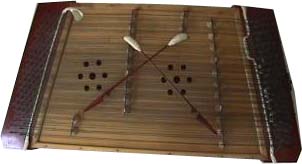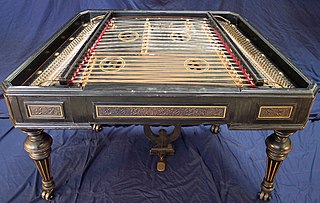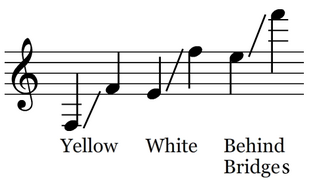
The hammered dulcimer is a percussion-stringed instrument which consists of strings typically stretched over a trapezoidal resonant sound board. The hammered dulcimer is set before the musician, who in more traditional styles may sit cross-legged on the floor, or in a more modern style may stand or sit at a wooden support with legs. The player holds a small spoon-shaped mallet hammer in each hand to strike the strings. The Graeco-Roman dulcimer derives from the Latin dulcis (sweet) and the Greek melos (song). The dulcimer, in which the strings are beaten with small hammers, originated from the psaltery, in which the strings are plucked.

The tsymbaly is the Ukrainian version of the hammer dulcimer. It is a chordophone made up of a trapezoidal box with metal strings strung across it. The tsymbaly is played by striking two beaters against the strings.

The cimbalom or concert cimbalom is a type of chordophone composed of a large, trapezoidal box on legs with metal strings stretched across its top and a dampening pedal underneath. It was designed and created by V. Josef Schunda in 1874 in Budapest, based on his modifications to the existing Hammered dulcimer instruments which were already present in Central and Eastern Europe.

Old-time music is a genre of North American folk music. It developed along with various North American folk dances, such as square dancing, clogging, and buck dancing. It is played on acoustic instruments, generally centering on a combination of fiddle and plucked string instruments, most often the banjo, guitar, and mandolin.

The Appalachian dulcimer is a fretted string instrument of the zither family, typically with three or four strings, originally played in the Appalachian region of the United States. The body extends the length of the fingerboard, and its fretting is generally diatonic.

The trapezoidal yangqin is a Chinese hammered dulcimer, likely derived from the Iranian santur or the European dulcimer. It used to be written with the characters 洋琴, but over time the first character changed to 揚, which means "acclaimed". It is also spelled yang quin or yang ch'in. Hammered dulcimers of various types are now very popular not only in China, but also Eastern Europe, the Middle East, India, Iran, and Pakistan. The instruments are also sometimes known by the names "santoor" and "cymbalom". This instrument had an influence on the Thai classical instrument, known as Khim (ขิม).
George Derek Fleetwood Bell, MBE was a Northern Irish harpist, pianist, oboist, musicologist and composer who was best known for his accompaniment work on various instruments with The Chieftains.

Jean Ruth Ritchie was an American folk singer, songwriter, and Appalachian dulcimer player, called by some the "Mother of Folk". In her youth she learned hundreds of folk songs in the traditional way, many of which were Appalachian variants of centuries old British and Irish songs, including dozens of Child Ballads. In adulthood, she shared these songs with wide audiences, as well as writing some of her own songs using traditional foundations. She is ultimately responsible for the revival of the Appalachian dulcimer, the traditional instrument of her community, which she popularized by playing the instrument on her albums and writing tutorial books. She also spent time collecting folk music in the United States and in Britain and Ireland, in order to research the origins of her family songs and help preserve traditional music. She inspired a wide array of musicians, including Bob Dylan, Joan Baez, Shirley Collins, Joni Mitchell, Emmylou Harris and Judy Collins.
Malcolm Dalglish is an American hammered dulcimer player and builder, composer, and choral director.
Sean McAloon (1923–1998) was a piper and pipe maker from Northern Ireland. Originally from the Rosslea area of County Fermanagh, McAloon's first instrument was the fiddle. However, he is best known as a master of the uilleann pipes. He emigrated to the United States in 1964, but after a year he returned to Ireland. He spent eight months working as a builder's labourer in Dublin, but moved to Belfast in 1966 to be closer to his family. There, he got a job working for the Corporation Parks Department.
Chet Parker was a hammered dulcimer player from Michigan.
Salterio is the Italian, Spanish, and Portuguese term for either of two types of zither: the hammered dulcimer or psaltery.
Evan Carawan is an American hammered dulcimer player from Knoxville, Tennessee. He is the son of folk musicians Candie and Guy Carawan. Evan Carawan learned to play hammered dulcimer from his father, who was a pioneer in reviving American interest in the instrument. Carawan typically plays in old-time music, Irish, and new-age styles.
Mitzie Collins is an interpreter of traditional British and American vocal and instrumental music.

John Doherty was an Irish folk fiddler.

Paddy Glackin is an Irish fiddler and founding member of the Bothy Band. He is considered one of Ireland's leading traditional fiddle players.

Acoustic Christmas Carols: Cowboy Christmas II is the twenty-second album by American singer-songwriter Michael Martin Murphey and his second album of Christmas music. Recorded at St. James Episcopal Church in Taos, New Mexico, the church Murphey attended at the time, the album consists of carols from the nineteenth century or earlier played on acoustic instruments, among them "Silent Night" and "Joy to the World". Murphey's arrangements feature his own finger-picked guitar, accompanied by John McEuen on banjo or mandolin, or Paul Sadler on hammer dulcimer. Murphey's sons, Ryan and Brennan, play blues guitar licks on "Go Tell It on the Mountain", and his daughter, Laura, sings a duet with her father on "Silent Night". This is a "spare and reverent Christmas album, appropriate for a rustic celebration in a Western church."

Sue Harris is an English musician classically trained as an oboeist, but best known for her folk music performances with the hammered dulcimer.

The santur, is a hammered dulcimer of Iranian or Mesopotamian origins.

Three Score and Ten: A Voice to the People is a multi-CD box set album issued by Topic Records in 2009 to celebrate 70 years as an independent British record label.












